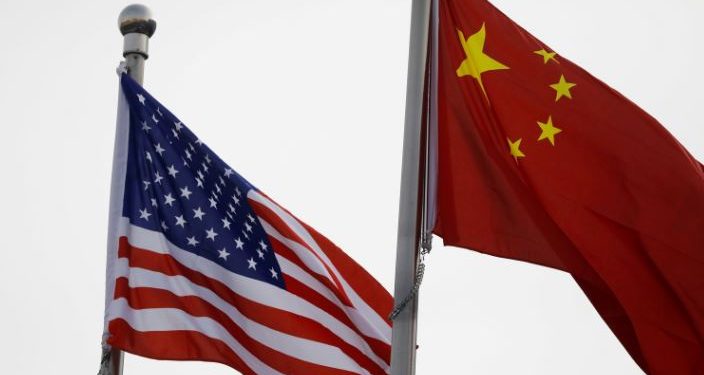Beijing: China Thursday said it would resolutely adopt countermeasures after President Donald Trump imposed 34 per cent tariffs on its over USD 438 billion imports to America, the country’s third largest export market, and urged Washington to immediately cancel these duties.
Trump announced tariffs on Chinese imports Wednesday as part of sweeping measures aimed at reshaping American trade policy.
China firmly opposes the US “reciprocal tariffs” and will resolutely adopt countermeasures to safeguard its rights and interests, said a spokesperson for the Ministry of Commerce after Trump’s announcement.
“History shows that increasing tariffs cannot solve the United States’ own problems. It harms US interests and endangers global economic development as well as industrial and supply chain stability,” according to the spokesperson.
“There is no winner in a trade war, and protectionism leads nowhere,” official media quoted the spokesperson as saying.
The US determined the so-called “reciprocal tariffs” based on subjective and unilateral evaluation, which does not comply with international trade rules, severely damages the legitimate rights and interests of relevant parties, and is a typical practice of unilateral bullying, the spokesperson said.
China urges the US to immediately cancel its unilateral tariff measures and properly resolve differences with its trading partners through equal dialogue, the spokesperson said.
The tariffs brought the total levies on China to 54 per cent, close to the 60 per cent Trump threatened during his poll campaign.
Trump earlier imposed two rounds of 10 per cent tariffs on Chinese goods, first in February and then in March this year.
Trump had said he would consider lowering tariffs on China if Beijing supported a deal for ByteDance to divest its short-video app TikTok to a US buyer.
China earlier retaliated against Trump’s tariffs with an additional 15 per cent tariffs on American goods and initiated legal action against Washington in the World Trade Organisation (WTO).
Additionally, China added 10 US firms to the country’s unreliable entity list and took corresponding measures against them.
They include a number of companies linked to defence and security besides AI, aviation, IT and dual-use items that carry both civilian and military applications.
Though Chinese officials argue that the new tariffs would hurt the US consumers more, the new tariffs were expected to lower substantial exports to the US hitting its industries back home heavily which is already reeling under the impact of the slowdown of the Chinese economy.
The US constitutes China’s third biggest export destination after ASEAN and the European Union.
The US total goods trade with China was an estimated USD 582.4 billion in 2024, according to the figures from the Office of the US Trade Representative.
US goods exports to China in 2024 were USD 143.5 billion, while the US imports from China in 2024 totalled USD 438.9 billion.
US goods trade deficit with China was USD 295.4 billion in 2024.
With heavy tariffs, Trump is putting pressure on China to buy more US industrial and agricultural goods and products.
Speaking from the White House’s Rose Garden, Trump said, “We’re going to be charging a discounted reciprocal tariff of 34 per cent.”
China, he said, charged tariffs of 67 per cent to the US, noting that the figure included the effects of currency manipulation and trade barriers.
The new 34 per cent tariffs on Chinese imports reflect a 10 per cent universal baseline plus 24 per cent specific to the country. The 10 per cent will come into effect April 5 while the higher reciprocal tariffs will take effect April 9.
Trump had vowed for months to impose reciprocal tariffs to match other countries’ higher tariff rates for specific goods and offset non-tariff barriers that put US exports at a disadvantage, the Hong Kong-based South China Morning Post reported.
The new levies, Trump said, would correct years of unfair trade during which other countries had been ripping off the US.
At the White House, Trump described his actions on China as tough love.
“I have great respect for President Xi (Jinping) of China, great respect for China, but they were taking tremendous advantage,” he said.
PTI







































